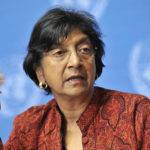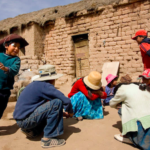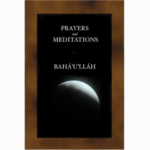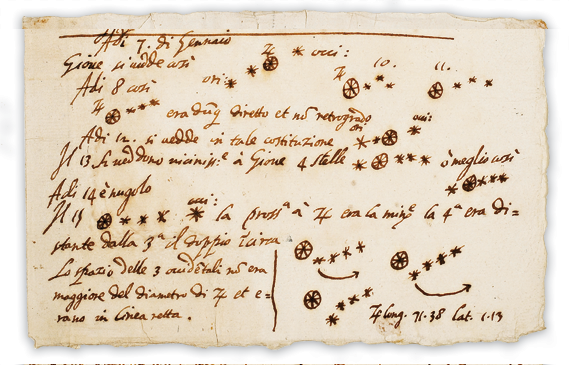
Bahá’u’lláh on Human Rights
 Abdu’l Baha would, in his talks in 1911 and 1912 introducing Bahá’u’lláh’s teaching, identify a list of principles drawn from the teachings of Bahá’u’lláh. The list was not always exactly the same – and Abdu’l Baha would often introduce them with words such as “and among the teachings of Bahá’u’lláh”. We have already explored some of these topics, for example the oneness of humanity, the oneness of religion, the harmony of science and religion, equality of men and women, the balancing of material and spiritual in society.
Abdu’l Baha would, in his talks in 1911 and 1912 introducing Bahá’u’lláh’s teaching, identify a list of principles drawn from the teachings of Bahá’u’lláh. The list was not always exactly the same – and Abdu’l Baha would often introduce them with words such as “and among the teachings of Bahá’u’lláh”. We have already explored some of these topics, for example the oneness of humanity, the oneness of religion, the harmony of science and religion, equality of men and women, the balancing of material and spiritual in society.
Abdu’l Baha also included human rights in that list. We should note that when he did so, there was no worldwide consensus around human rights. The Universal Declaration of Human Rights was still decades away, and international human rights treaties even further. Before the world got there, millions died in unimaginably vast and obscene violations of human rights.
Abdu’l Baha listed human rights in a speech on 9 June 1912 at the Baptist Temple in the city of Philadelphia. (Notably Philadelphia was where the US Declaration of Independence was adopted – which begins with the words “We hold these truths to be self-evident, all man have been created equal …”). This is what Abdu’l Baha said:
Seventh, Bahá’u’lláh taught that an equal standard of human rights must be recognized and adopted. In the estimation of God all men are equal; there is no distinction or preferment for any soul in the dominion of His justice and equity.[1]
Like the other principles that Abdu’l Baha states – they often read like a road map of the achievements of the 20th century. 36 years later the Universal Declaration of Human Rights was adopted. Its first and second articles contain words such as these:
All human beings are born free and equal in dignity and rights. They are endowed with reason and conscience and should act towards one another in a spirit of brotherhood. … Everyone is entitled to all the rights and freedoms set forth in this Declaration, without distinction of any kind, such as race, colour, sex, language, religion, political or other opinion, national or social origin, property, birth or other status.
The bulk of the Universal Declaration of Human Rights is a list of specific rights and prohibitions that protect human rights, but if we consider the brief extract above we can discern some of the values embedded in the Universal Declaration. Among these are equality of all human beings, human freedom, human dignity and “brotherhood” – friendship, solidarity and mutual caring between all human beings.
The concept of rights appears on numerous occasions in Bahá’u’lláh’s writings, and Abdu’l Baha’s statement above gives us insight where to look. The way Abdu’l Baha describes the concept echoes the earliest mystical period of Bahá’u’lláh’s writings.
In respect of the values noted above, on equality we find:
Know ye not why We created you all from the same dust? That no one should exalt himself over the other.[2]
On solidarity Bahá’u’lláh writes:
… it is incumbent on you to be even as one soul, to walk with the same feet, eat with the same mouth and dwell in the same land, that from your inmost being, by your deeds and actions, the signs of oneness and the essence of detachment may be made manifest[3]
Indeed, while equality and freedom have been emphasised in human rights discourse – solidarity has lagged behind — even though it is so central to achievement of all human rights values.
Or in his later writings:
HE Who is your Lord, the All-Merciful, cherisheth in His heart the desire of beholding the entire human race as one soul and one body.[4]
Or elsewhere:
Ye are the fruits of one tree and the leaves of one branch. Deal ye one with another with the utmost love and harmony, with friendliness and fellowship …
On human dignity:
I created thee rich, why dost thou bring thyself down to poverty? Noble I made thee, wherewith dost thou abase thyself? Out of the essence of knowledge I gave thee being, why seekest thou enlightenment from anyone beside Me? Out of the clay of love I molded thee, how dost thou busy thyself with another? Turn thy sight unto thyself, that thou mayest find Me standing within thee, mighty, powerful and self-subsisting.
On freedom Bahá’u’lláh writes that he has:
… consented to be bound with chains that mankind may be released from its bondage, and hath accepted to be made a prisoner within this most mighty Stronghold that the whole world may attain unto true liberty …
A less well-known dimension of human rights is that its very conception implies human responsibilities. If you have a human rights, I have a responsibility in respect of that human right. If it were not so human rights would be meaningless. Thus article 29 of the Universal Declaration of Human Rights states: “Everyone has duties to the community in which alone the free and full development of his personality is possible“.
We may note the way in which Bahá’u’lláh frames human responsibility:
Do not busy yourselves in your own concerns; let your thoughts be fixed upon that which will rehabilitate the fortunes of mankind and sanctify the hearts and souls of men.
A study of human rights instruments highlights that their principal focus is on constraining the injustice of governments – the excess of abuse of power. It was a theme that Bahá’u’lláh also explored.
God hath committed into your hands the reins of the government of the people,that ye may rule with justice over them, safeguard the rights of the down-trodden and punish the wrong-doers …
Many of Bahá’u’lláh’s teachings are echoed in specific provisions of the Universal Declaration: the abolition of slavery, universal education, equality of men and women, the abolition of poverty (although the abolition of extreme wealth is not found in human rights instruments), the right to life, the right to social security where a person is unable to earn a living, protection of property, protection of privacy and reputation, freedom of opinion, and protection of communities from persecution.
Peace is another theme we find in Bahá’u’lláh’s writings – as we do in human rights instruments. We have already seen that Bahá’u’lláh condemned all forms of violence. This includes political violence — a position that is not taken by human rights instruments.
As has been noted in a previous article, the oneness of humanity is the pivot of Bahá’u’lláh’s teachings. The continuing absence of human unity is a principal reason that human rights remain unachieved for so many human beings.
With such a body of teachings, as well as its own history of being subject to severe religious persecution in the land of its birth, it is unsurprising that the Baha’i community has a long history of supporting human rights.
As with many of these articles, this article just introduces an area, without a full exploration of all its dimensions.
(This article is the 90th in a series of what I hope will be 200 articles in 200 days for the 200th anniversary of the birth of Bahá’u’lláh. The anniversary is being celebrated around the world on 21 and 22 October 2017, The articles are simply my personal reflections on Bahá’u’lláh’s life and work. Any errors or inadequacies in these articles are solely my responsibility.)






